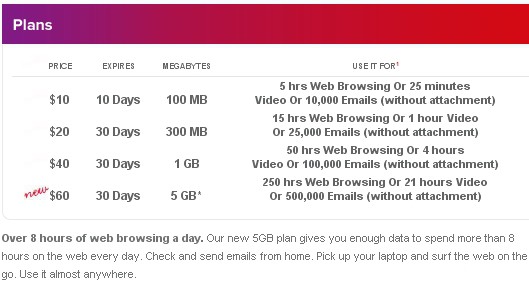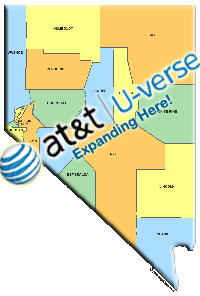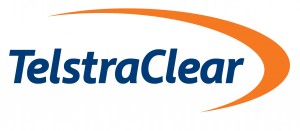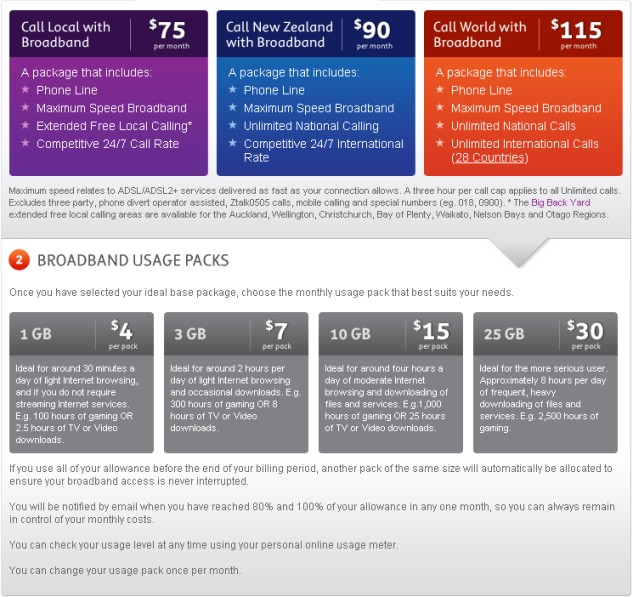
Charter customers thank the company for the speed increases
Charter Cable has made it clear — no metered billing and no enforcement of its “soft usage caps.”
“We have no plans to introduce metered billing,” Ketzer told Broadband Reports, adding no trials were forthcoming either.
But Charter Cable did say bandwidth consumption is a concern for the company, and a measurement tool to educate customers about their current usage was on the way.
“Right now we are gathering requirements to develop a resource so that customers can monitor and control their bandwidth resources,” said Ketzer. “This was something that our customers have been requesting and we want to meet that need.”
Separately, Charter also announced speed upgrades for many of its broadband customers. Starting this morning, customers can briefly unplug their cable modems to reset them and enjoy some increased speeds at no additional cost.

Charter's old speed tiers (shown above) got an upgrade this morning. Prices quoted are for new customers. Existing customers: add $15 -- Internet Only customers: add $25
The new speed increases impact three of their broadband plans. Only “Lite” speeds remain unchanged:
- Lite: Remains the same at “up to” 1 Mbps/128 kbps
- Express: Increases from 5/1 Mbps to 8/1 Mbps
- Plus: Increases from 10/2 Mbps to 16/2 Mbps
- Max: Increases from 20/2 Mbps to 25/3 Mbps
Charter advises Max customers will need to exchange their current cable modem to receive the new speeds. They come as a result of DOCSIS 3 upgrades, which requires a modem that supports that standard.
Some Charter customers can go even faster with the company’s Ultra60 plan delivering 60/5Mbps service for $139.99 a month. Customer promotions, typically running six months, can cut the cost to $109.99 during the promotional period.
Increasing speeds and shelving Internet Overcharging schemes like usage limits and usage-based billing build customer loyalty and bring new customers, particularly at the expense of telephone company DSL plans, which cannot compete on speed. Most DSL providers have stopped increasing speeds beyond the maximum 6-10 Mbps they have advertised for years. Many barely deliver 3 Mbps.
AT&T, which provides service in many Charter markets, has raised the stakes for competition as it rolls out U-verse, an advanced type of DSL service that can support video, telephone, and faster broadband. In Reno, where AT&T has conducted usage cap experiments for more than a year, the news that Charter won’t comes as welcome news.
 Stop the Cap! reader David canceled AT&T service when he found out the company was testing a usage cap in Reno.
Stop the Cap! reader David canceled AT&T service when he found out the company was testing a usage cap in Reno.
“When we found out they were limiting us (after we signed up), we not only canceled AT&T broadband, but also disconnected our two phone lines as well,” David writes. “We won’t do business with a company that wants to limit our broadband use and we resented being guinea pigs in the first place.”
David adds a “retention specialist” offered to waive his participation in the trial, but he wasn’t interested and is not looking back.
“Unless you deliver a clear message these ripoffs are unacceptable in a way they understand – money – they will just come back for more once the ‘experiment’ is over,” he said.
David is happy with his Charter Cable service, and estimates AT&T’s experiment cost them nearly $200 a month in revenue they used to earn from his family.
“Their cost control program certainly worked — for me. I’m saving more money with Charter than what I was paying AT&T,” he adds. “I wouldn’t have switched except for their usage cap.”
Charter itself has some broadband usage limits, but they are almost never enforced.
Charter currently defines “normal” residential usage at around 15 gigabytes per month. Charter’s usage allowances appear in its “excessive use” clause in the Acceptable Use Policy:
Residential service usage will not exceed 100GB of bandwidth per month for Customers subscribing to Services of 15 Mbps or less per month and 250GB of bandwidth per month for Customers subscribing to Service over 15 Mbps and up to 25 Mbps. Charter reserves the right to revise usage limits or to implement additional usage limits. In the event residential usage exceeds the above-described limits Customer will be notified and required to either limit Customer’s bandwidth consumption to permitted levels/limits or subscribe to a Service with a higher monthly bandwidth limit if a higher limit subscription is available.
Since these limits have not been aggressively enforced, they are known as “soft usage caps.” Most Internet Service Providers have provisions for such limits in their customer agreements, although they are usually only enforced only when a customer’s usage reaches into the stratosphere (often terabytes of usage are involved) or creates a problem for the provider.
Still, some customers dropped Charter Cable even over the defined “soft caps,” switching to competitors who had no such provisions in their usage policies. Consumers hate Internet Overcharging schemes, and will readily change providers to avoid them.
[flv width=”500″ height=”380″]http://www.phillipdampier.com/video/Charter Thank You Ad 3-1-2010.flv[/flv]
Charter Cable created this ad from customer recorded submissions sent over their Internet service (1 minute)


 Subscribe
Subscribe









